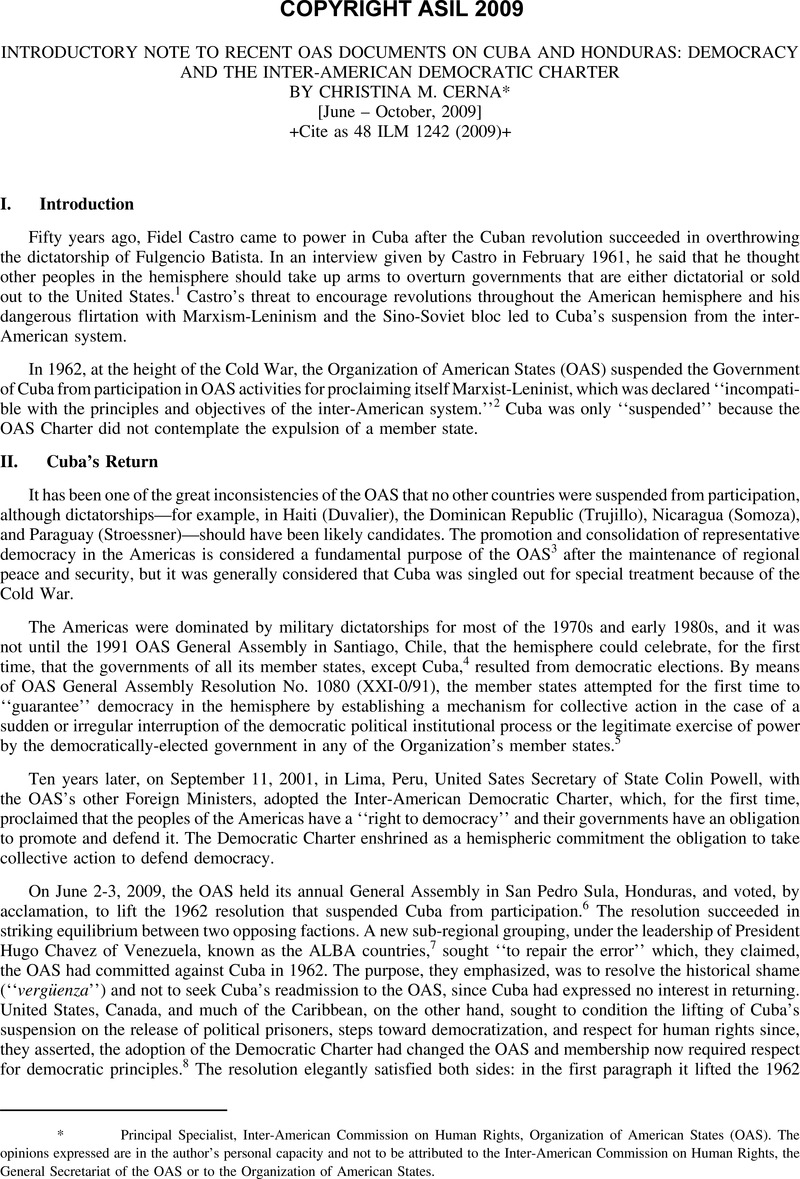Published online by Cambridge University Press: 27 February 2017

* This text was reproduced and reformatted from the text available at the Organization of American States website (visited Oct. 21, 2009) <http://www.oas.org/en/default.asp>
1 Interview with Fidel Castro by Arminio Savioli, The Nature of Cuban Socialism, L’Unita (Feb. 1, 1961), available at http://www.marxists.org/history/cuba/archive/castro/1961/02/01.htm.
2 Final Act, Eighth Meeting of Consultation of Ministers of Foreign Affairs, Punta del Este, Uruguay, January 22-31, 1962, Resolution VI, Exclusion of the Present Government of Cuba from Participation in the inter-American System.
3 See Charter of the Organization of American States art. 2, opened for signature Apr. 30, 1948, 2 U.S.T. 2394 (entered into force Dec. 13, 1951). The Charter enumerates the ‘‘essential purposes’’ of the OAS:
“To promote and consolidate representative democracy, with due respect for the principle of nonintervention.” Id. art. 2. “The American States reaffirm the following principles:. . .[d] The solidarity of the American States and the high aims which are sought through it require the political organization of those States on the basis of the effective exercise of representative democracy.” Id. art. 3.
4 It should be recalled that Cuba was suspended from participation in OAS activities but it never ceased to be a member state of the OAS.
5 Resolution on Representative Democracy, AG/RES. 1080 (XXI-0/91) (June 5, 1991), (the Resolution was adopted at the fifth plenary session).
6 The June 3, 2009 OAS General Assembly Resolution on Cuba resolved ‘‘[t]hat Resolution VI, adopted on January 31, 1962, at the Eighth Meeting of Consultation of Ministers of Foreign Affairs, which excluded the Government of Cuba from its participation in the Inter-American system, hereby ceases to have effect in the Organization of American States (OAS).’’ Resolution on Cuba, AG/RES.2438 (XXXIX-0/09) (June 3, 2009).
7 ALBA is the Spanish acronym for Bolivarian Alliance for the Peoples of our America (Alianza Bolivariana para las Americas) and is currently (December 2009) comprised of nine countries: Venezuela, Cuba, Bolivia, Nicaragua, Ecuador, Dominica, Honduras, St Vincent and the Grenadines, and Antigua and Barbuda.
8 The second paragraph of the June 3, 2009 Resolution on Cuba reflected the position of these States and resolved ‘‘[t]hat the participation of the Republic of Cuba in the OAS will be the result of a process of dialogue initiated at the request of the Government of Cuba, and in accordance with the practices, purposes, and principles of the OAS.’’
9 Reportedly four commandos of approximately 200 soldiers were involved in the operation.
10 The question to be asked in this preliminary poll was: ‘‘Are you in accord that in the general elections of November 2009 there be included a fourth ballot in which the people decide whether to convoke a National Constituent Assembly?’’ There was concern that the referendum was designed to lead to a modification of the Constitution to permit President Zelaya to run for a second four year term.
11 Const. Hond. art. 239 reads: ‘‘No citizen who has already served as head of the Executive Branch can be President or a designated person. Whoever violates this law or proposes its reform, as well as those that support such violation directly or indirectly, will immediately cease in their functions and will be unable to hold any public office for a period of 10 years.’’ The 1982 Constution of the Republic of Honduras is available at http://pdba.georgetown.edu/Constitutions/Honduras/hond82.html.
12 Roberto Micheletti was a liberal congressman for approximately thirty years and is credited with drafting the current Constitution. See Zelaya planificaba disolver el Congreso, El Heraldo, June 28, 2009, available at http://www.elheraldo.hn/Ediciones/2009/06/29/Noticias/Zelaya-planificaba-disolver-el-Congreso. The constitutional succession to the presidency in Honduras is the Vice President, followed by the president of the Congress.
13 Resolution on the Political Crisis in Honduras, AG/RES.1 (XXXVII-E/09) (July 1, 2009).
14 Inter-American Democratic Charter art. 21, 40 I.L.M. 1289 (2001) provides:
When the special session of the General Assembly determines that there has been an unconstitutional interruption of the democratic order of a member state, and that diplomatic initiatives have failed, the special session shall take the decision to suspend said member state from the exercise of its right to participate in the OAS by an affirmative vote of two thirds of the member states in accordance with the Charter of the OAS. The suspension shall take effect immediately. The suspended member state shall continue to fulfill its obligations to the Organization, in particular its human rights obligations. Notwithstanding the suspension of the member state, the Organization will maintain diplomatic initiatives to restore democracy in that state.
15 Resolution to Suspend Honduras from OAS, AG/RES.2 (XXXVII-E/09) (July 4, 2009) (the session began on July 4th, but the Resolution was not adopted until early in the morning of July 5, 2009).
16 A delegation of the Inter-American Commission on Human Rights conducted an on-site visit to Honduras from August 17-21, 2009. The Inter-American Commission ‘‘confirmed the existence of a pattern of disproportionate use of public force, arbitrary detentions and the control of information aimed at limiting political participation by a sector of the citizenry.’’ 17 The official name of the agreement is the ‘‘Guaymuras Dialogue Tegucigalpa/San José Agreement for National Reconciliation and the Strengthening of Democracy in Honduras,’’ available at http://hondurascoup2009.blogspot.com/2009/07/san-jose-accord-translation-and.html.
18 Almost as a denouement to this political drama, on December 2, 2009, the Honduran Congress overwhelmingly voted against the reinstatement of ousted President Zelaya.